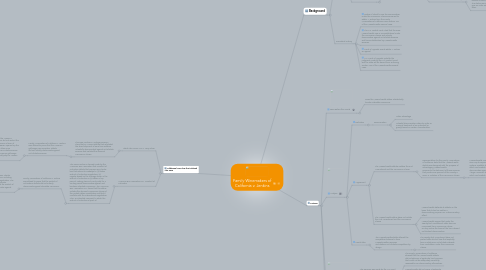
1. Additional Case law that Utilized This Case
1.1. Black Starr Farms LLC v. Jerry Oliver
1.1.1. This case involves a Michigan winery's claim that an Arizona statute that regulated the direct shipment of wine from wineries unlawfully discriminated against out-of-state wineries and violated the dormant Commerce Clause.
1.1.1.1. Family Winemakers of California v. Jenkins was utilized to prove that the Arizona's gallonage cap exception Statute did not unfairly discriminate against out-of-state wineries.
1.1.1.1.1. The Courts found that the Arizona's gallonage cap exception did not restrict the flow of interstate commerce in favor of in-state wineries. It however, opened up the State's wine market to allow more out-of-state wineries than in-state wineries to take advantage of Arizona's gallonage cap exception and directly ship to Arizona consumers.
1.2. American Bus Association Inc. v District of Columbia
1.2.1. This case involves a claimed made by the American Bus Association that a District of Columbia statute that requires any charter bus that enters its roadways to (1) obtain District of Columbia registration, (2) register based on the mileage driven in the District of Columbia or (3) obtain a trip permit, costing $50 and is only valid for a six-day period discriminates against and burdens interstate commerce. The American Bus Association Inc. claims that this statue violates the dormant Commerce Clause of the United States Constitution and that it conflicts with the International Registration Plan, an interstate compact, to which the District of Columbia is apart of.
1.2.1.1. Family Winemakers of California v. Jenkins was utilized to prove that the District of Columbia's Statute did not unfairly discriminate against interstate commerce.
1.2.1.1.1. The American Bus Associations' charter includes a fee-payment option, including an option for apportioned registration. The American Bus Associations Charter dissolves their argument that the District of Columbia's Statute discriminates against interstate operators.
2. Background
2.1. Facts
2.1.1. Parties
2.1.1.1. Petitioner: Eddie J. Jenkins
2.1.1.1.1. The Chair of the Massachusetts Alcoholic Beverages Control Commission
2.1.1.2. Respondent: Family Winemakers of California
2.1.2. What Happened
2.1.2.1. The Family Winemakers of California brought forth a Civil Case to the Federal Court Circuit.
2.1.2.1.1. The Family Winemakers of California Version of the Story
2.1.2.1.2. Eddie J. Jenkins Version of the Story
2.2. Procedural History
2.2.1. Notice of Intent to Sue for Discrimination under the Commerce Clause was issued to Eddie J. Jenkins from the Family Winemakers of California over Section 19F of the Massachusetts General Laws.
2.2.2. The U.S. District court ruled that the 2006 Massachusetts Law is unconstitutional under the Commerce Clause and actively discriminates against out-of-state wineries and favors distribution by Massachusetts wineries.
2.2.3. Court of Appeals Grants Eddie J. Jenkins an appeal.
2.2.4. U.S. Court of Appeals upholds the judgment made by the U.S. District Court and the state will be barred from enforcing Section 19F of the Massachusetts General Laws.
3. Critique
3.1. Issue Before the Courts
3.1.1. Does the Massachusetts statue substantially burden interstate commerce.
3.2. Analysis
3.2.1. Definition
3.2.1.1. Discrimination
3.2.1.1.1. Unfair advantage
3.2.1.1.2. Unlawful discrimination refers to unfair or unequal treatment of an individual (or group) based on certain characteristics.
3.2.2. Arguement
3.2.2.1. The Massachusetts statute violates the 21st Amendment and the Commerce Clause
3.2.2.1.1. Representation for the Family Winemakers of California state that the Massachusetts statute was designed with the purpose of advantaging Massachusetts wineries to the detriment of those wineries that produce 98 percent of the country's wine, in violation of the Commerce Clause.
3.2.2.2. The Massachusetts statue does not violate the 21st Amendment and the Commerce Clause
3.2.2.2.1. Massachusetts defends its statute on the basis that its law has neither a discriminatory purpose nor a discriminatory effect.
3.2.2.2.2. Massachusetts argues that under the Twenty-first Amendment, state laws are immunized from Commerce Clause scrutiny unless the basis of the law is based on blantent discrimination.
3.2.3. Courts take
3.2.3.1. The Massachusetts statute altered the competitive balance to favor Massachusetts's wineries and disfavor out-of-state competition by design.
3.2.3.1.1. The Twenty-first Amendment does not protect state alcohol laws that explicitly favor in-state over out-of-state interests from invalidation under the Commerce Clause.
3.3. Decision
3.3.1. The Decision was made by the U.S Court of Appeals to uphold the decision by the U.S. District Court and not reverse the decision.
3.3.1.1. The Family Winemakers of California showed that the Massachusetts statute did not advance a legitimate local purpose that could not be adequately served by reasonable non-discriminatory alternatives.
3.3.1.2. Massachusetts did not prove a legitimate local purposes for the statute and a lack of non-discriminatory alternatives
3.3.1.3. The Massachusetts statue placed a clear competitive advantage to "small" wineries, which included all Massachusetts's wineries, and created a comparative disadvantage for "large" wineries, none of which are in Massachusetts.
3.4. Rule Of Law
3.4.1. Constitutionality: 21st Ammendement and the Commerce Clause
3.4.1.1. Application
3.4.1.1.1. The Commerce Clause prevents states from creating protectionist barriers to interstate trade.
3.4.1.2. Conclusion
3.4.1.2.1. The Massachusetts Statue violates the 21st Ammednment and the Commerce Clause
